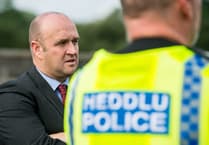Two men have been sentenced for Powys rural burglaries and vehicle thefts.
Michael Evans, 34, from Merthyr Tydfil was sentenced at Swansea Crown Court on October 20 2021 to two years imprisonment after pleading guilty to the theft of a Land Rover from a farm in Llangorse, theft of a Mitsubishi L200 from a farm again in Llangorse, a burglary in Llangorse and a further theft of a quad bike from Brilley, Powys. The offences were committed in 2019.
Evans was initially linked to the offences through mobile phone enquiries. He was arrested November 22 2019 and was found in possession of cloned number plates that linked him to a burglary in Brilley, Powys, where quad bikes, a campervan and tools were stolen. The stolen campervan was recovered in Swansea the following day following a police pursuit. The vehicle was bearing false number plates.
When Evans was arrested footwear was recovered and forensically examined. The footwear impressions at the scenes of the offences matched the footwear recovered from his home address.
Simon Lester appeared at Swansea Crown Court on October 26 2021 and was sentenced to 18 months after pleading guilty to charges of handling stolen goods.
When Lester was arrested in Merthyr Tydfil January 4 2020 he was found in possession of Ford car keys which unlocked a Ford Fiesta found nearby.
Checks showed this vehicle had been stolen from a burglary in the Crickhowell area whilst the elderly occupant was at home asleep.
His fingerprint was found on the cloned number plates on the stolen campervan. A text message was found by officers sent from Evans to Lester the morning after the burglary. That text message contained the details of the cloned registration number the vehicle was on.
Lester was charged with handling stolen goods for these two offences.
Further text messages found on Evans’ phone showed discussions to steal quad bikes and 4 x 4 style vehicles.
Sergeant Thomas Songhurst said
“Burglary can have a devastating effect on victims and we’re committed to catching those responsible and putting them before the courts.
“Telephony and forensic work were essential in linking the two defendants to each other and to the crimes. The evidence was strong enough that they pleaded guilty and were sentenced to prison.”




